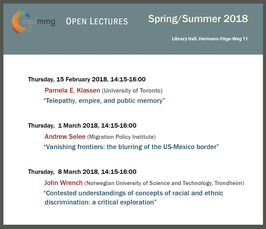"Telepathy, empire, and public memory"
Open Lectures Spring/Summer 2018
- Datum: 15.02.2018
- Uhrzeit: 14:15 - 16:00
- Vortragende(r): Pamela E. Klassen (University of Toronto)
- Pamela Klassen is Professor in the Department for the Study of Religion at the University of Toronto. She currently holds the Anneliese Maier Research Award from the Humboldt Foundation, in support of a five-year collaborative project entitled “Religion and Public Memory in Multicultural Societies,” undertaken together with Prof. Dr. Monique Scheer of the University of Tübingen. Her writings include: Blessed Events: Religion and Home Birth in America (Princeton UP, 2001) and Spirits of Protestantism: Medicine, Healing, and Liberal Christianity (University of California Press, 2011). She has two books forthcoming with the University of Chicago Press: The Story of Radio Mind: A Missionary’s Journey on Indigenous Land, and Ekklesia: Three Inquiries in Church and State, co-authored with Paul Christopher Johnson and Winnifred Fallers Sullivan.
- Ort: MPI-MMG, Hermann-Föge-Weg 11, Göttingen
- Raum: Library Hall

For more details please contact recke(at)mmg.mpg.de.
In an era of government-sponsored processes of apology, truth, and reconciliation for colonial violence and dispossession, what is the burden of public memory? To hazard an answer to this question, I reflect on my process of narrating the story of an early-twentieth-century Anglican missionary in the Pacific Northwest who thought telepathy was the solution to everything from class warfare to religious divisions. At the same time that he experimented his way to the unorthodox metaphysics of “radio mind”, Archbishop Frederick Du Vernet was condemning the abuses of the Canadian church-state residential school system, which forcibly took Indigenous children from their families in order to assimilate them to Christianity, the English language, and acceptance of the sovereignty of the Dominion of Canada. As conflicts over the ongoing significance of religion—especially Christianity—continue to flare up in nation-states across North America and Europe, what difference does a story like radio mind make?
Co-organized by the Department of Ethics, Law and Politics and the Department of Socio-Cultural Diversity